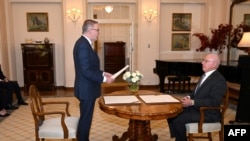Australia’s new prime minister was sworn in Monday before flying to Japan for talks with U.S. President Joe Biden and other world leaders. Labor Party leader Anthony Albanese won Saturday’s general election, ending almost a decade of conservative government.
Albanese’s left-of-center government faces key foreign policy challenges, including an increasingly fractious relationship with China.
The new prime minister said bilateral ties with Beijing are “difficult.” They have been strained in recent years over various geopolitical disputes.
Beijing recently signed a security pact with Solomon Islands, a hitherto traditional ally of Australia in the Pacific. That has prompted fears of greater Chinese expansionism in the region. Labor had accused the then conservative government of neglecting Australia’s neighbors in the Pacific.
Analysts expect the new Albanese government to focus its diplomatic efforts in South-East Asia on boosting alliances to counter China’s assertiveness.
Albanese will attend Tuesday’s Quad summit in Tokyo with U.S. President Joe Biden and the leaders of India and Japan.
Labor’s deputy leader Richard Marles told the Australian Broadcasting Corporation that the unprecedented nature of Beijing’s leadership creates difficulty.
“China remains a significant challenge and we will seek to engage in the world in a professional and thoughtful way," he said. "We are obviously believers in diplomacy. But China under President Xi [Jinping] has sought to shape the world around it in a way that we have never seen before and that does present challenges for the nation, and we need to make sure that we meet those challenges, and we do that by making sure that we are getting our relationships right in the region, that we pay the Pacific the attention that it deserves, which this coalition government plainly failed to do.”
It’s still not clear if Albanese will be able to form a majority government or must work in coalition with other parties, such as independents and the Greens. They both enjoyed a surge in support in Saturday’s election, which marks a major shift in Australian politics away from the two major parties.
The outgoing government suffered a major loss, and the former Prime Minister Scott Morrison has resigned as Liberal Party leader.
Analysts believe that years of inertia in Australia on climate change could be about to end under the Albanese government.
The final composition of the new Australian parliament could take days, or even weeks, to determine under the country’s complex preferential electoral system.





